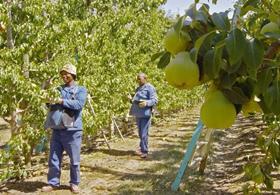
Fruit growers in the Western Cape are considering contingency plans for the coming season to cope with the worsening drought in the region.
South African deciduous fruit industry body, Hortgro, said in a statement that it had been one of the driest winters in recent history, with unprecedented low dam levels and pressure on the water infrastructure servicing Cape Town and other municipal areas in the region.
Other industries, namely stonefruit and table grapes, are also severely affected, with the situation in certain area at a critical level. The question now is just how much of the region’s water will be released for agriculture, given the fact that the demand is increasing in the urban areas of the region.
Hortgro looked to highlight the plight of the fruit growing community, calling fruit trees a long term investment with orchards bearing fruit over multiple seasons.
“Fruit farmers, who are reliant on irrigation water to produce their crops, apprehensively await rains to fill up their dams,' the group stated. 'The water situation differs between regions – with some growers reporting enough water to at least see through most of the summer, while others report only fractions of the required amounts of water available for the coming season.”
Hortgro outlined that it recently held an irrigation seminar for fruit growers to help equip them with tools and strategies to mitigate the impact of the drought as best as possible.
“Since the future scenario of a drying climate requires that all new plantings are highly efficient, the seminar revisited the basic principles of irrigation design and planning,' the organisation stated. 'Stages during the season when trees might be more or less sensitive to drought stress or when conditions allow water saving, were identified. Various practices and technologies to save water such as mulching, restricting irrigation to the root zone, and netting were discussed.'
A drought strategy presented by Hortgro involved ranking and allocating water to orchards according to profitability. This would entail optimal irrigation of highly profitable orchards, restriction of water allocation to less profitable orchards and the removal of unproductive orchards.
The true impact of the drought is shown by the fact that many growers have brought forward their plans to remove older, less productive orchards over the next couple of years in order to stretch the water they do have as far as possible.
“Others have decided to remove all the fruit from trees, in anticipation of the fact that they will not be able to raise both a crop and keep their trees alive. In the end the allocation of water will be an economical decision with the most productive long term crops getting the advantage over lower yielding orchards or short term crops like onions and potatoes,” said Hortgro.






No comments yet